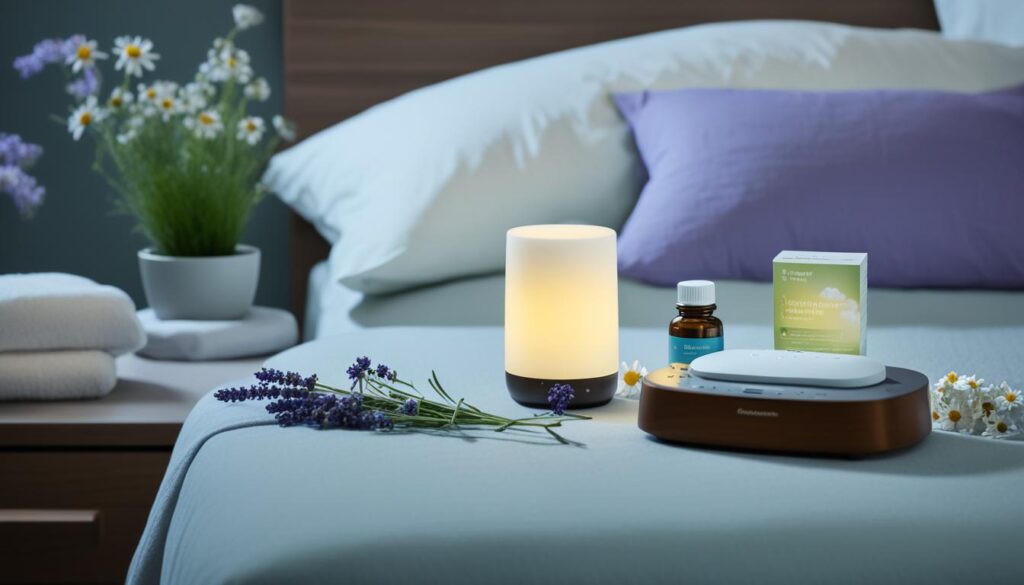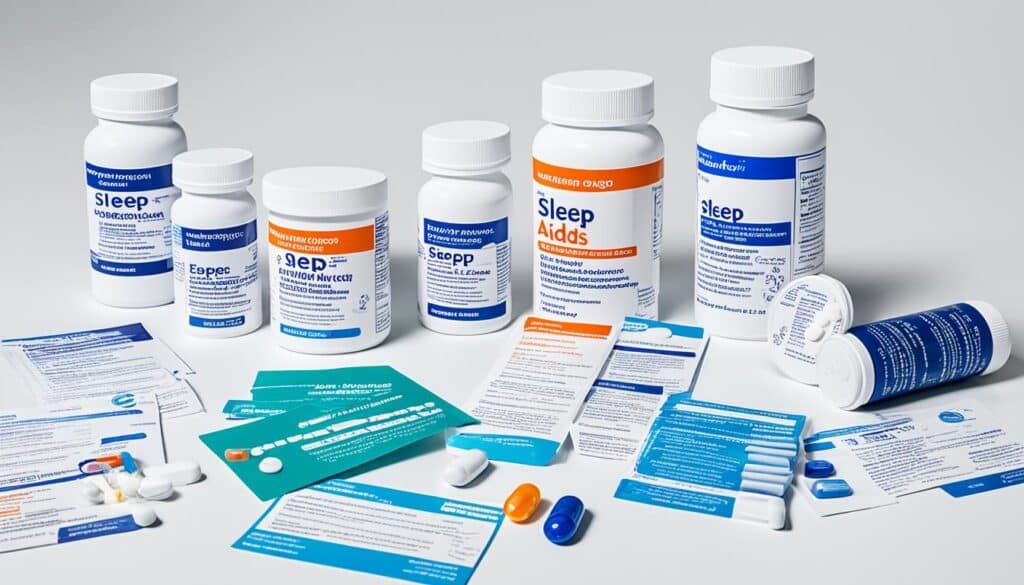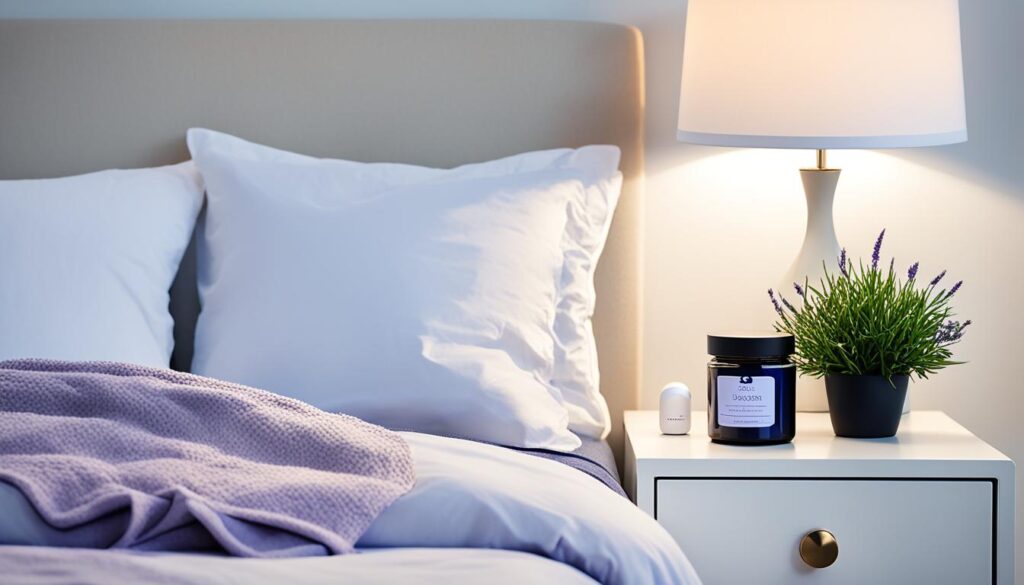Do you find yourself tossing and turning at night, yearning for sleep that never comes? You’re not alone. Many Americans face insomnia, a condition that affects your health and happiness. But, there are many sleep aids out there to help you sleep better.
This guide will cover the top 5 natural sleep aids for insomnia, including natural and prescription options. Whether you want a gentle solution or something stronger, we’ve got you covered. By the end, you’ll know the pros and cons of each aid, helping you choose the best one for you.
Key Takeaways
- Discover the top 5 best sleep aids for insomnia, including both natural and prescription options.
- Learn about the effectiveness, safety, and potential side effects of various sleep aids.
- Understand how to choose the right sleep aid for your individual needs and preferences.
- Explore natural remedies and lifestyle changes that can complement your sleep aid regimen.
- Gain insights into the pros and cons of prescription sleep aids and their potential risks.
Table of Contents
Understanding Insomnia and Its Impact
Insomnia is a sleep disorder that makes it hard to fall asleep, stay asleep, or wake up too early. It can greatly affect a person’s health and daily life. It impacts mood, daily activities, and overall well-being.
Stress, anxiety, depression, medical issues, and bad sleep habits are common causes of insomnia. Stress and anxiety often make the mind race, making sleep hard to achieve.
Symptoms of insomnia include trouble falling asleep, waking up often at night, and waking up too early. People with insomnia may feel tired, irritable, and find it hard to focus. They might also see a drop in productivity.
Insomnia without treatment can lead to serious health problems. These include a higher risk of heart disease, high blood pressure, and diabetes. It can also worsen mental health issues like depression and anxiety, making sleep problems worse.
Knowing the causes and symptoms of insomnia is key to tackling this sleep issue. It helps in finding ways for a good night’s sleep.
“Insomnia is a symptom, not a stand-alone diagnosis or a disease. It is instead the primary complaint of an inability to obtain sufficient sleep, and it is a symptom experienced by people with a variety of sleep, medical, and psychiatric disorders.” – National Sleep Foundation
Natural Sleep Aids for Insomnia
Insomnia can be tough and hard to deal with, making it hard for many to get a good night’s sleep. Luckily, there are natural sleep aids that might help ease insomnia and make sleep better.
Herbal remedies are one type of natural sleep aid. Herbs like valerian, chamomile, and melatonin have been used for a long time to help you sleep better. They work with your body’s sleep cycle and are often safer than prescription sleep drugs.
Dietary supplements are also popular for helping with sleep. Supplements like magnesium, calcium, and omega-3 fatty acids can improve sleep. These nutrients are important for your body’s sleep processes, making them a good choice for fighting insomnia.
| Natural Sleep Aid | Potential Benefits | Suggested Dosage |
|---|---|---|
| Valerian | May improve sleep quality and reduce the time it takes to fall asleep | 300-900 mg before bedtime |
| Chamomile | May have a mild sedative effect and reduce stress and anxiety | 400-1,600 mg before bedtime |
| Melatonin | Helps regulate the body’s sleep-wake cycle | 0.5-5 mg before bedtime |
| Magnesium | Plays a role in regulating sleep and may improve sleep quality | 300-500 mg before bedtime |
Remember, while these natural sleep aids can help some people, it’s best to talk to a healthcare professional before trying them. This is especially true if you have health issues or take other medicines.
“The use of natural sleep aids can be a safe and effective way to address insomnia, but it’s crucial to understand their potential benefits and limitations.”
Looking into natural sleep aids for insomnia can help you find what works best for you. This way, you can improve your sleep without harming your overall health.
Herbal Remedies and Supplements
Natural solutions like herbal remedies and supplements are popular for fighting insomnia. Melatonin, valerian root, and chamomile are top choices. They are well-studied and widely used.
Melatonin is a hormone that helps control our sleep and wake cycles. Taking melatonin supplements can help improve sleep quality and length. This is especially true for people with jet lag or sleep issues from shift work.
Valerian root has been a go-to for insomnia for centuries. It helps you fall asleep faster and sleep better. This might be because it affects the brain’s GABA receptors.
Chamomile is known for its calming effects and is often used to help with sleep. While not as scientifically proven as melatonin and valerian root, it might help with mild insomnia.
It’s important to use these herbal remedies correctly and talk to a doctor first. This is especially true if you have health issues or take other medicines. The right amount and possible side effects can vary, so be careful.
| Herbal Remedy | Potential Benefits for Insomnia | Dosage Recommendations |
|---|---|---|
| Melatonin | Regulates sleep-wake cycle, improves sleep quality and duration | 0.5-5 mg before bedtime |
| Valerian Root | Reduces time to fall asleep, improves overall sleep quality | 300-900 mg before bedtime |
| Chamomile | Mild sedative properties, may help alleviate insomnia symptoms | 400-1,600 mg before bedtime |
While these remedies and supplements can be useful, always talk to a healthcare professional. They can help find the best and safest option for you.
Best Sleep Aids for Insomnia
Do you struggle with insomnia? You’re not alone. Many people worldwide have trouble sleeping. Luckily, there are many sleep aids out there to help. We’ll look at the best ones for insomnia, including over-the-counter and prescription options.
Over-the-Counter Sleep Aids
Many people choose over-the-counter sleep aids to help with insomnia. These products often have melatonin, valerian root, or diphenhydramine. These ingredients can make you sleepy and help you sleep better. But, always read the labels and follow the instructions to avoid side effects.
Prescription Sleep Aids
If you have chronic or severe insomnia, you might need prescription sleep aids. These include medications like zolpidem, eszopiclone, and suvorexant. They work deeper to help you sleep better. But, you’ll need a doctor’s prescription and should talk about the risks and side effects with your doctor.
| Sleep Aid | Type | Potential Benefits | Potential Drawbacks |
|---|---|---|---|
| Melatonin | Over-the-Counter | Natural sleep regulator, helps with jet lag | May cause daytime drowsiness, interactions with medications |
| Zolpidem | Prescription | Effective for falling and staying asleep | Risk of dependence, next-day impairment |
| Valerian Root | Over-the-Counter | Mild sedative effects, may improve sleep quality | Potential liver toxicity, interactions with medications |
Choosing the right sleep aid for insomnia depends on your needs and health. Always talk to your doctor to find the best option for you. It’s important to weigh the risks and benefits of each sleep aid.

Safe and Effective Sleep Aids Without Side Effects
If you’re having trouble sleeping, finding a safe and effective sleep aid is key. There are many options that can help you sleep well without harming your health.
Melatonin, a hormone that helps control sleep, is a popular choice. It’s a non-habit-forming way to deal with safe sleep aids for insomnia. Valerian root, an herb, has been used for years to relax and improve sleep.
Sleep aids without side effects include chamomile and lavender. These herbs can be made into teas or taken as supplements. They help calm the mind and body, making it easier to sleep.
For a tailored solution, consider non-habit-forming sleep aids like magnesium or glycine. These nutrients are important for healthy sleep. They can be used with other natural remedies for better sleep.
“Finding a safe and effective sleep aid can be a game-changer for those struggling with insomnia. The key is to explore natural, non-habit-forming options that address the root cause of your sleep issues without introducing unwanted side effects.”
Always talk to a healthcare professional before trying new sleep aids, especially if you have health issues or take other medicines. With the right advice, you can find a safe and effective way to sleep well.
Lifestyle Changes for Better Sleep
Getting enough sleep is key for your health and happiness. While sleep aids can help now and then, changing your lifestyle can make a big difference over time. Let’s look at some easy ways to improve your lifestyle changes for better sleep, sleep hygiene, and stress management for better sleep.
Keeping a regular sleep schedule is very important. Try to go to bed and wake up at the same time every day, even on weekends. This helps your body get into a rhythm, which is key for good sleep.
Having a calming bedtime routine can also help a lot. You might want to take a warm bath, read a book, or do some light stretching or meditation before bed. These activities tell your body it’s time to sleep.
- Limit your screen time and blue light before bed, as it can mess with your sleep cycle.
- Make sure your bedroom is dark, cool, and quiet for the best sleep.
- Working out during the day can make you feel sleepy at night, but don’t exercise too close to bedtime.
Dealing with stress is also key for lifestyle changes for better sleep. Stress can make it hard to fall asleep and stay asleep. Using stress-management techniques like deep breathing, meditation, or journaling can help you relax before bed.
| Lifestyle Change | Benefit for Better Sleep |
|---|---|
| Consistent Sleep Schedule | Regulates Circadian Rhythm |
| Relaxing Bedtime Routine | Signals Body to Wind Down |
| Stress Management | Reduces Anxiety and Improves Sleep Quality |
By making these lifestyle changes for better sleep, you can set up your environment and routine for better sleep. Remember, good sleep is crucial for your health and happiness. So, make it a top priority in your life.
Choosing the Right Sleep Aid for You
Choosing the right sleep aid is key. You need to think about how bad your insomnia is, what you prefer, and any side effects you might face. These factors are very important.
For mild insomnia, natural sleep aids like herbal remedies or supplements could work well. They usually have fewer side effects. But for more serious insomnia, you might need prescription sleep aids.
Before picking a sleep aid, it’s smart to talk to a healthcare provider. They can figure out why you’re having trouble sleeping and suggest the best treatment. They’ll also help with dosage, talk about possible side effects with other medicines, and check how well the sleep aid is working.
- Consider the severity of your insomnia when choosing a sleep aid
- Explore natural and herbal remedies for mild sleep issues
- Consult with a healthcare provider to determine the best sleep aid for your needs
- Discuss potential side effects and interactions with your healthcare provider
The best sleep aid for you will depend on your unique situation and health history. By understanding your options and working with a healthcare professional, you can find a solution for restful sleep.
“Getting the right amount of sleep is essential for our overall health and well-being. Don’t hesitate to seek guidance from a healthcare provider to find the most suitable sleep aid for your individual needs.”
Prescription Sleep Aids: Pros and Cons
Prescription sleep aids can be both helpful and risky for managing insomnia. These drugs aim to make it easier to fall asleep and stay asleep. It’s important to know the good and bad before thinking about them.
One big plus of these aids is how quickly they work for those with ongoing sleep issues. They help people fall asleep faster and sleep more soundly. This can make daytime life better, reduce tiredness, and boost overall happiness.
But, there are downsides to using these aids. Side effects might include feeling dizzy, sleepy during the day, having trouble remembering things, and even becoming dependent. Using them for a long time can make them less effective, needing more of the drug to work.
| Pros of Prescription Sleep Aids | Cons of Prescription Sleep Aids |
|---|---|
|
|
Always use prescription sleep aids with a doctor’s advice. They’re best for severe or ongoing sleep problems, especially if other methods didn’t work. It’s key to think about the pros and cons and keep an eye on how they work.
“Prescription sleep aids can be a helpful tool, but they should be used judiciously and in consultation with a healthcare provider.”
Choosing to use prescription sleep aids should be a team effort with a healthcare professional. They’ll look at the benefits and risks, and consider your health and sleep habits.

Over-the-Counter Sleep Aids: Risks and Benefits
Many people with insomnia look to over-the-counter (OTC) sleep aids for help. These products seem like a quick solution, but it’s important to know the risks and benefits.
OTC sleep aids include things like antihistamines and herbal supplements. Options like diphenhydramine, doxylamine, melatonin, and valerian root are common. While they can help you sleep, they also have things to consider.
| Common OTC Sleep Aids | Potential Benefits | Potential Risks |
|---|---|---|
| Antihistamines |
|
|
| Melatonin |
|
|
| Valerian Root |
|
|
Using OTC sleep aids should be done with care. Always talk to a healthcare professional before using them for a long time. Finding the real cause of insomnia, like stress or lifestyle, might help you sleep better for good.
Choosing to use OTC sleep aids should be a joint decision with a healthcare provider. Consider your health history and the risks and benefits of each option.
Integrating Sleep Aids with Other Therapies
Getting good sleep is key to feeling well, especially if you have insomnia. Using sleep aids with other treatments and lifestyle changes helps tackle sleep problems from all sides. This way, people can find lasting ways to sleep better.
Using sleep aids, natural or by prescription, can help you fall asleep faster and sleep better. But when you add other therapies, these aids work even better over time.
Cognitive-behavioral therapy (CBT) is great when used with sleep aids. It teaches new ways to cope with insomnia, changes negative thoughts, and helps you sleep better. This can make your sleep much improved.
Adding lifestyle changes like exercise, stress relief, and better eating can also help. These changes tackle the physical and environmental things that mess with your sleep. Together with sleep aids, they work even better.
Doctors often suggest using sleep aids with other proven therapies for insomnia. This way, you tackle the real reasons behind your sleep problems. It leads to better and lasting results for those who struggle with insomnia.
| Therapy | Benefits | Potential Outcomes |
|---|---|---|
| Cognitive-Behavioral Therapy (CBT) | Addresses psychological and behavioral aspects of insomnia | Improved sleep onset, quality, and duration |
| Lifestyle Modifications | Targets physical and environmental factors affecting sleep | Enhanced overall sleep health and well-being |
| Sleep Aids | Provides immediate relief and promotes sleep | Facilitates the effectiveness of other therapies |
By combining sleep aids with proven therapies, you can create a full plan to fight insomnia. This approach looks at sleep problems from every angle, leading to better and lasting results.
“The key to managing insomnia is to address the problem from multiple angles, using a combination of therapies that work synergistically to improve sleep quality and overall well-being.”
Conclusion
There are many sleep aids out there to help those with insomnia get better sleep. You can try natural remedies, like herbal supplements and changing your lifestyle. Or, you might look into over-the-counter or prescription drugs. The goal is to find what works best for you.
We’ve looked at the good and bad of different sleep aids. It’s key to talk to a healthcare provider to find the right one. By figuring out why you’re not sleeping well and trying different treatments, you can get better sleep.
Remember, finding the perfect sleep aid might take time. Be patient and try different things. If needed, get help from a professional. With the right sleep aid and a good plan, you can get the restful sleep you need.
FAQ
What are the most effective natural sleep aids for insomnia?
Melatonin, valerian root, chamomile, and magnesium are top natural sleep aids for insomnia. They boost sleep quality and length without the downsides of prescription drugs.
Are there any prescription sleep aids that are safe and effective for treating insomnia?
Yes, prescription sleep aids like benzodiazepines (Ambien, Lunesta) and non-benzodiazepine hypnotics (Belsomra, Dayvigo) are safe and effective. Always talk to your doctor to find the right one for you.
What are some sleep aids that do not have side effects?
Melatonin, valerian root, and chamomile are natural sleep aids with fewer side effects. Some over-the-counter options like doxylamine and diphenhydramine might be safe for some people. Always check with a healthcare professional before trying any sleep aid.
How can I choose the right sleep aid for my insomnia?
Think about how bad your insomnia is, your health, any medical conditions, and what you prefer. Talk to a healthcare provider to find the best sleep aid for you. They might suggest lifestyle changes and sleep aids together.
What are the risks and benefits of prescription sleep aids?
Prescription sleep aids can help with insomnia but have risks and side effects. They can improve sleep quality and help you fall asleep faster. But, they might make you drowsy during the day, lead to dependence, affect memory, or interact badly with other drugs. Always talk to your doctor about the pros and cons.
How do over-the-counter sleep aids compare to prescription sleep aids?
OTC sleep aids are less strong than prescription ones and work for mild to moderate insomnia. They’re easier to get, cheaper, and might have fewer side effects. But, they might not work as well for severe insomnia. Always read the label and talk to a healthcare provider before using them.
How can I integrate sleep aids with other therapies for insomnia?
Combining sleep aids with therapies like CBT, relaxation techniques, and lifestyle changes works best for insomnia. This approach tackles the root causes of insomnia, improves sleep, and reduces the need for sleep aids. Your healthcare provider can help create a plan that includes sleep aids and other therapies for the best results.

Hello, I’m Dr. Asher Quinn, a sleep expert dedicated to the transformative power of restorative rest. In today’s fast-paced world, sleep is one of our most sacrificed needs, but I’m here to show you how quality sleep can massively enhance your productivity and well-being. After years of research and practical solutions, I help people take back control of their nights and maximize their days. Want to wake up refreshed and energized? Let’s dive into the science of better sleep!

